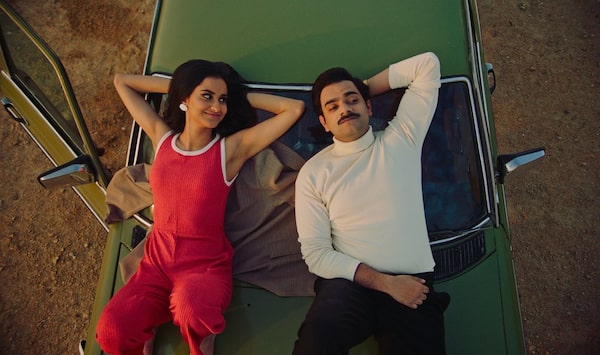- The Queen of My Dreams
- Directed by Fawzia Mirza
- Written by Fawzia Mirza
- Starring Amrit Kaur, Nimra Bucha, Hamza Haq
- Classification PG; 97 minutes
Even the most casual of Bollywood fans will know the iconic song, Mere Sapnon Ki Rani from the 1969 hit film Aradhana. The movie starred Bollywood icons Rajesh Khanna and Sharmila Tagore, in all their beehived and glossy-lipped glory. It featured a plotline where Tagore plays both lover and mother to father-and-son characters played by Khanna in a double role. The song continues to be belted out by Romeos of today, especially when making very public displays of their affections.
The title – and spirit – of Fawzia Mirza’s debut feature borrows from the English translation of the song title: The Queen of My Dreams. Mirza’s film started out as a one-character play they performed, and then took a decade-long journey to transform first into a short and then a full-length film. In between, Mirza made several other short films, including Noor & Layla, The Syed Family Xmas Eve Game Night and Auntie.
Perhaps it’s a case of living with a project for too long. Or maybe it’s a case of a story that doesn’t quite morph so easily from one medium to another. While The Queen of My Dreams works in some places, it’s too disjointed a narrative to truly immerse the viewer into the technicolor universe. It’s an ambitious project, an attempt to tell a multigenerational story of faith, culture, queer and diasporic identities, all tied together by a mother and daughter’s love for a Bollywood romance. But that homage also drags the movie out.
Too many movies on your to-watch list? Here are the best films of 2023
Amrit Kaur in a scene from the film The Queen of My Dreams.HO/The Canadian Press
The story begins with Azra (Amrit Kaur), a young queer Muslim woman in Toronto who wants to become an actress, much to the chagrin of her mother Mariam (Nimra Bucha). Mariam, a devout Muslim, frowns on her daughter’s life choices, including living with her roommate Rachel (Kya Mosey); it’s never spelled out, but we get a sense that Mariam might be aware that Rachel is, in fact, Azra’s girlfriend. Stuck in the middle of the mother-daughter duo is Hassan (Hamza Haq), a gentle man who knows how to placate both his wife and daughter.
However, during a trip to Karachi, Pakistan, Hassan suddenly dies. Azra makes an emergency trip back with her brother Zahid (Ali A. Kazmi) and negotiates her grief with her mother’s refuge in the strictures of their faith. This trip back to Pakistan triggers a flashback of a fictitious Karachi in the 60s, where a younger Mariam (played by Kaur, in a double role) is being courted by Hassan (still Haq).
We get to see the events that turned that younger, boisterous Mariam, who didn’t care for social conventions, into Mariam-the-mom, who eventually submits to her new life in Nova Scotia. Hassan, a doctor, and Mariam move to Canada to raise their kids Azra (played as a teen by Ayana Manji) and Zahid (still Kazmi), we learn from another set of flashbacks. It’s where the first cracks between mother and daughter start to appear.
The idea for the film likely worked on paper. The cast is great. We’ve seen Kaur, Bucha and Haq in a range of recent works; The Sex Lives of College Girls, Ms. Marvel and Transplant, respectively, to name a few. Other luminaries from the Pakistani film and TV industry also show up in smaller roles. These are seasoned actors, and yet they’re unable to break through a level of artifice; likely a case of lack of direction. Kaur is droll as Azra, and gives it her best to step into Mariam’s rebelliousness. Ditto for Haq, who is charming as the young Hassan, alternatively charismatic and charmed by Mariam. However, his turn as an older version of himself isn’t entirely believable.

The Queen of My Dreams premiered at the 2023 Toronto International Film Festival.Andria Wilson/Handout
As much as Mirza’s vision of Karachi in the 1960s carries the fun of DayGlo colours of the era, that sense of pretense carries over from the actors to the production. It feels like a film shot on sets and in front of green screens. And frankly, there’s one too many frames of Tagore and Khanna, crooning along the tracks of the Darjeeling Himalayan Express train.
There are several fun and smart moments in the middle. How suitors coming over for tea in Karachi parallels Tupperware gatherings in Nova Scotia. Mariam and Azra being doppelgangers not just in looks, but also actions. But other times the joke – a fluorescent pink watering can, for example – is out of context, at best; forced, at worst.
Watching the movie made me wish I’d seen the play. I can understand how the song’s refrain might have worked in a stage production. How this intensely personal story of coming of age, coming out and coming to terms with a mother, could have been a moving experience because we would have experienced all of that through the actor on stage. We don’t get that sense of a character arc for Azra on the film screen.
Some projects, perhaps, work out better in dreams.
In the interest of consistency across all critics’ reviews, The Globe has eliminated its star-rating system in film and theatre to align with coverage of music, books, visual arts and dance. Instead, works of excellence will be noted with a critic’s pick designation across all coverage. (Television reviews, typically based on an incomplete season, are exempt.)